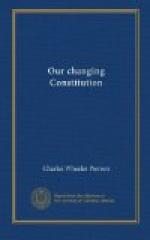The amendment is an invasion of the sovereignty of the complaining state and her people, not contemplated by the amending clause of the Constitution. The amending power ... is not a substantive power but a precautionary safeguard inserted incidentally to insure the ends set forth in that instrument against errors and oversights committed in its formation. Amendments, as the term indeed implies, are to be limited to the correction of such errors....
It is “This Constitution” that may be amended. “This Constitution” is not a code of transient laws but a framework of government and an embodiment of fundamental principles. By an amendment, the identity or purpose of the instrument is not to be changed; its defects may be cured, but “This Constitution” must remain. It would be the greatest absurdity to contend that there was a purpose to create a limited government and at the same time to confer upon that government a power to do away with its own limitations.
[Footnote 1: Id., pp. 354-356.]
The Attorney General of the State of New Jersey:[1]
attacked the amendment as an invasion of state sovereignty not authorized by the amending clause and as not, properly speaking, an amendment, but legislation, revolutionary in character.
[Footnote 1: 253 U.S., pp. 356-357.]
The eminent Chicago lawyer, Levy Mayer, and ex-Solicitor
General William
Marshall Bullitt, contended,[1] among other things,
that
the power of “amendment” contained in Art. V does not authorize the invasion of the sovereign powers expressly reserved to the states and the people by the Ninth and Tenth Amendments, except with the consent of all the states....
If amendment under Art. V were unlimited, three-fourths of the legislatures would have it in their power to establish a state religion and prohibit free exercise of other religious beliefs; to quarter a standing army in the houses of citizens; to do away with trial by jury and republican form of government; to repeal the provision for a president; and to abolish this court and with it the whole judicial power vested by the Constitution.
[Footnote 1: Id., pp. 357-361.]
Elihu Root, preeminent as a constitutional lawyer, appeared as counsel in one of the test cases. His main contention was summarized in his brief as follows:[1]
(a) That the authority to amend the Constitution is a continuance of the constitution-making power and as such is a power quite different and altogether distinct from the law-making power under the Constitution.
(b) That a grant of
the one power does not include or imply a
grant of the other.
(c) That the natural and ordinary meaning of the words used in Article V of the Constitution [the article providing for amendment] limits the power granted to the function of constitution-making as distinguished from ordinary law-making.
(d) That the purposes of the grant imply the same limitation.




